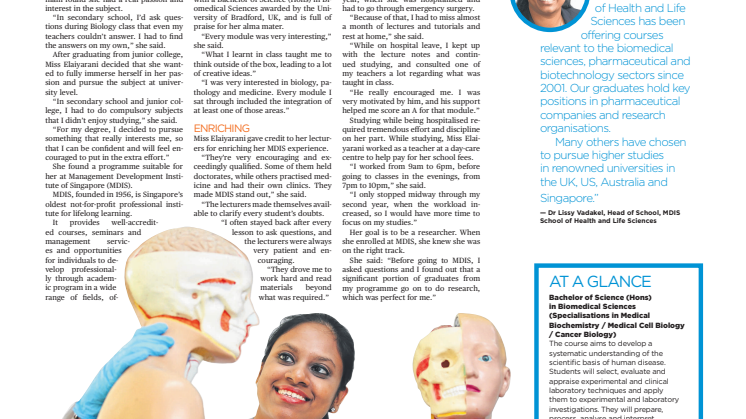News -
On track for a research career
She loves studying biology.
As early as when she was in secondary school, 25-year-old Elaiyarani Subramaniam found she had a real passion and interest in the subject. “In secondary school, I’d ask questions during Biology class that even my teachers couldn’t answer. I had to find the answers on my own,” she said.
After graduating from junior college, Miss Elaiyarani decided that she wanted to fully immerse herself in her passion and pursue the subject at university level. “In secondary school and junior college, I had to do compulsory subjects that I didn’t enjoy studying,” she said. “For my degree, I decided to pursue something that really interests me, so that I can be confident and will feel encouraged to put in the extra effort.”
She found a programme suitable for her at Management Development Institute of Singapore (MDIS). MDIS, founded in 1956, is Singapore’s oldest not-for-profit professional institute for lifelong learning. It provides well-accredited courses, seminars and management services and opportunities for individuals to develop professionally through academic program in a wide range of fields, of- On track for a research career fered in collaboration with highly acclaimed international universities.
Miss Elaiyarani recently graduated with a Bachelor of Science (Hons) in Biomedical Sciences awarded by the University of Bradford, UK, and is full of praise for her alma mater. “Every module was very interesting,” she said. “What I learnt in class taught me to think outside of the box, leading to a lot of creative ideas.” “I was very interested in biology, pathology and medicine. Every module I sat through included the integration of at least one of those areas.”
Enriching
Miss Elaiyarani gave credit to her lecturers for enriching her MDIS experience. “They're very encouraging and exceedingly qualified. Some of them held doctorates, while others practised medicine and had their own clinics. They made MDIS stand out,” she said. “The lecturers made themselves available to clarify every student’s doubts.
“I often stayed back after every lesson to ask questions, and the lecturers were always very patient and encouraging. “They drove me to work hard and read materials beyond what was required.” Miss Elaiyarani needed all the support and encouragement from her lecturers before the start of her second year, when she was hospitalised and had to go through emergency surgery.
“Because of that, I had to miss almost a month of lectures and tutorials and rest at home,” she said. “While on hospital leave, I kept up with the lecture notes and continued studying, and consulted one of my teachers a lot regarding what was taught in class. “He really encouraged me. I was very motivated by him, and his support helped me score an A for that module.” Studying while being hospitalised required tremendous effort and discipline on her part.
While studying, Miss Elaiyarani worked as a teacher at a day-care centre to help pay for her school fees. “I worked from 9am to 6pm, before going to classes in the evenings, from 7pm to 10pm,” she said. “I only stopped midway through my second year, when the workload increased, so I would have more time to focus on my studies.” Her goal is to be a researcher. When she enrolled at MDIS, she knew she was on the right track. She said: “Before going to MDIS, I asked questions and I found out that a significant portion of graduates from my programme go on to do research, which was perfect for me.”
The MDIS School of Health and Life Sciences has been offering courses relevant to the biomedical sciences, pharmaceutical and biotechnology sectors since 2001. Our graduates hold key positions in pharmaceutical companies and research organisations. Many others have chosen to pursue higher studies in renowned universities in the UK, US, Australia and Singapore.”
— Dr Lissy Vadakel, Head of School, MDIS School of Health and Life Sciences
AT A GLANCE
Bachelor of Science (Hons) in Biomedical Sciences (Specialisations in Medical Biochemistry / Medical Cell Biology / Cancer Biology) The course aims to develop a systematic understanding of the scientific basis of human disease. students will select, evaluate and appraise experimental and clinical laboratory techniques and apply them to experimental and laboratory investigations.
They will prepare, process, analyse and interpret experimental and clinical laboratory data, and be able to evaluate and apply health and safety policies and good laboratory practices. graduates can do medical research in hospitals, universities, research institutes or pharmaceutical companies.
Some become clinical scientists or medical laboratory scientific officers in hospitals, scientists in public health or forensic science laboratories, or join the food industry. Within the pharmaceutical and biotechnology industry, they can work as clinical trials coordinators and regulatory affairs executives. They can also work in medical information services, medical sales, and medical writing and publishing.
Source:[The New Paper Go Guide 03032014] © Singapore Press Holdings Limited. Reproduced with permission
Related links
Topics
- Adult education
Categories
- bachelor of science
- biomedical sciences
- school of health and life sciences
- pharmaceutical
- clinical scientists
- biotechnology
- research
- pathology
- medicine
- biology

